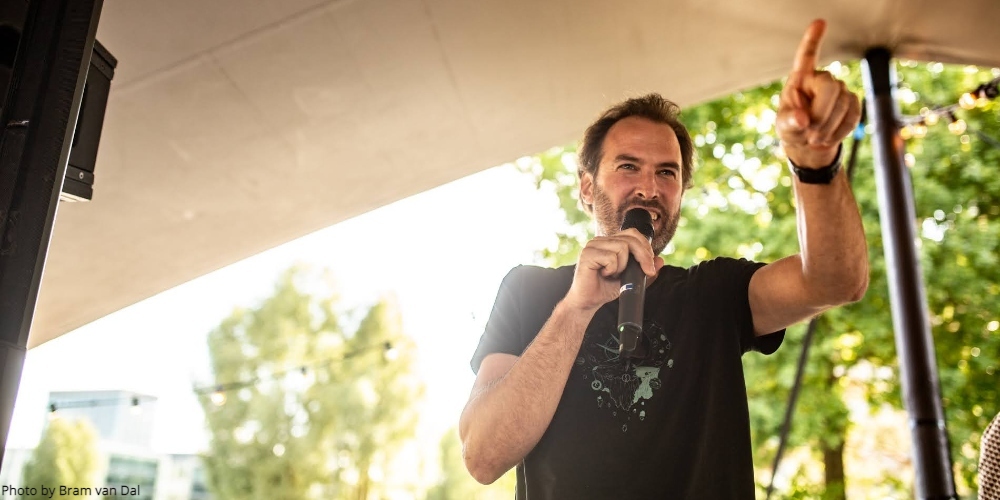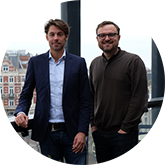What does it take to create an impactful business? Few are better positioned to answer that than Boudewijn Docter, co-founder of EFFECT Photonics and a key figure in the Dutch deep-tech ecosystem. With a background in electrical engineering and photonics, Boudewijn has spent years navigating the complex entrepreneurial journey.
His company is one of the pioneers of integrated photonics in the Netherlands and an example for other startups that it’s possible to build a successful business from scratch with a super complex technology as a basis. In this interview, he shares his entrepreneurial story, lessons learned from scaling deep-tech ventures, and insights on the evolving startup landscape in Eindhoven. Read on!

- Hi Boudewijn, thank you very much for agreeing to do the interview. Could you tell us about your background and how you got connected to the startup world?
My background is in electrical engineering with a PhD in photonics. During my bachelor’s and master’s studies at Twente University, I got a part-time job at a startup company developing design and simulation software for the first generation of photonic chips. This got me into the field of photonics but also showed me first-hand what it was like to work in a startup environment.
- You founded EFFECT Photonics, a highly vertically integrated, independent photonic optical systems company addressing the need for high-performance, affordable optic solutions driven by the ever-increasing demand for bandwidth and faster data transfer capabilities. Tell us about that entrepreneurial journey.
During my PhD at Eindhoven University of Technology, I was working on manufacturing technologies for photonic ICs. My project didn’t have a clear route to commercialization, but from my previous startup experience, I knew it was also a possibility to start something myself, but I didn’t know how or when the right moment was. I then saw a flyer at the university about a startup competition organized by Philips and the High-Tech Campus.
The competition was based on the MIT 100K Challenge. The first assignment was to write down your idea in 100 words to win 100 euros. I didn’t win the first round, but got sucked in and after the next 3 rounds ended up winning the competition! The 1st prize was 5000 euros, but the real benefit was the realization that people outside the research community were very interested in my technology and the potential it had to become a successful venture, so I started building a team around me.
It took quite a long time to then demonstrate the tech, raise first funding, mature the tech, raise more funding, turn it into a product, raise more funding, improve reliability, raise more, improve manufacturability, raise more, and finally launch the product.
In hindsight, the road was much longer than I expected, but very rewarding, and I’m super proud of what we were able to build with our team. EFFECT Photonics is still considered one of the pioneers of integrated photonics in the Netherlands and an example for other startups that it’s possible to build a successful business from scratch with a super complex technology as a basis.
- You worked as Chief Growth Officer at HighTechXL. What is it about entrepreneurship and helping startups scale that particularly attracts you?
What is really cool is to build something from scratch and always find a path forward through a complex landscape of technology development, fundraising, building a team and organization, etc.
Working with (young) founders who start this journey and helping them with practical advice is a lot of fun. Having done one successful venture does not mean that I have the recipe for guaranteed success, but having to deal with similar issues that the other founders are struggling with helps to place things in perspective.
Whether it is how to deal with complex IP strategies, supply chain issues, or team dynamics, having been through these challenges myself, I can give founders the confidence that these issues are solvable one way or another. Seeing founders taking advice and applying it in a way that makes sense for their venture is really cool. Many ventures are now scaling beyond what we thought initially possible.
- After years of working with startups as an advisor, what advice would you share with founders?
It’s a cliche, but building a deep-tech venture is a marathon, not a sprint. Take good care of yourself and your team. People often picture late-night work and pizza when they think about startups, and sometimes this is necessary to meet a deadline, but in the long term, it is more about a sound strategy and a solid team, and a good working environment.
This is also reflected in other parts of your strategy: Don’t go for a “better deal” with an investor who doesn’t understand your tech/market. It will bite you on the tail in the end.
Don’t scale your organization too quickly if your base tech is not ready to scale. Don’t diversify into other products or markets if you run the risk of spreading yourself too thin on your core. Don’t get stuck in technology development without validating what product your customers really value.
Most of the advice is pretty obvious. It is the practical implementation that is the art.
- What do you predict for the startup ecosystem in Eindhoven? What are the challenges and the opportunities the ecosystem is facing?
Also here, the challenges are the obvious topics around (lack of) funding, especially to scale, access to talent, barriers from rules and regulations, etc. However, as a fellow entrepreneur, Hamed Sadeghian, CEO of Nearfield Instruments, recently said very well: You can complain about these issues, but it is your job as an entrepreneur to deal with them. And it is possible, as long as you have a solid idea, a good team, and are able to explain your plans to different audiences at different levels of complexity. There are many examples out there, and most experienced entrepreneurs are happy to help the ecosystem where they can.
In that same spirit, a group of founders, including Tienko Rasker from Leapfunder, who was involved in the competition I mentioned before, and I, took the initiative to start a new Tech Transfer Challenge. In this challenge, we are trying to inspire researchers to think outside their academic bubble and see where their research can connect to the outside world and solve societal challenges today. We are running a pilot next academic season, so stay tuned!
Thank you for sharing your story and insights, Boudewijn. We wish you the best of luck in your future endeavors.
Join our network of startups & investors!


